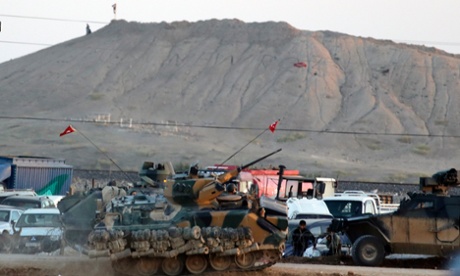 |
Islamic State fighters backed by tanks and artillery pushed into Kobani late on Monday, an embattled and strategically important Syrian town on the border with Turkey, touching off heavy street battles with its Kurdish defenders.
Hours after two Isis flags were raised on the outskirts of Kobani, the militants punctured the Kurdish front lines and advanced into the town itself, said the Local Co-ordination Committees activist collective and the British-based Syrian Observatory for Human Rights.
“They’re fighting inside the city. Hundreds of civilians have left,” said Observatory director Rami Abdurrahman. “Islamic State controls three neighbourhoods on the eastern side of Kobani. They are trying to enter the town from the southwest as well.”
The centre of the town was still in Kurdish hands, Abdurrahman said. Kurdish officials could not be immediately reached for comment. Reports from the Turkish side of the border on Tuesday morning suggesting the fighting had slowed overnight.
The Observatory reported airstrikes by the US-led coalition overnight but a Kurdish activist in Kobani, Mustafa Ebdi, said they had little effect. “The strikes hit the Mistenur area,” he said, referring to a plateau south of the city. “But [Isis] aren’t gathered there. There are other places they should be hitting.”
The two Isis flags were still seen in the east of the city, with a Kurdish flag flying in the centre.
Since it began its offensive in mid-September, Isis has barrelled through one Kurdish village after another as it closed in on its main target: the town of Kobani, also known as Ayn Arab. The assault has forced 160,000 Syrians to flee and put a strain on Kurdish forces, who have struggled to hold off the extremists even with the aid of US-led air strikes.
After initially setting up positions to the east, south and west of the town, Isis shelled Kobani for days to try to loosen up its defences. Just across the frontier in Turkey artillery, gunfire and smoke testified to the intensity of the fight all day on Monday.
“Isis is advancing further toward Kobani day by day,” said Ismet Sheikh Hassan, the defence chief for Kurdish forces in the area. “Isis is fighting with tanks and heavy weapons and they are firing randomly at Kobani. There are many civilian casualties because of the shelling.”
The Syrian Observatory for Human Rights said about 20 Islamic State fighters managed to sneak into the eastern part of Kobani but were ambushed and killed by Kurdish militiamen.
But in recent weeks the Kurds have struggled to counter the increasingly well-armed militants, who have been strengthened by heavy weapons looted from captured Syrian and Iraqi military bases.
As fighting raged on Monday within sight of the Turkish border, the country’s defence minister, Ismet Yilmaz, said Nato had drawn up a strategy to defend Turkey, a Nato member, in the event of attack along the frontier with Syria. The Nato move came at Turkey’s request, said Yilmaz.
On Monday at least 14 Turkish tanks took up defensive positions on a hilltop on Turkish soil near the beseiged town, while a shell from the fighting struck a house and a grocery store inside Turkey but no one was wounded.
Monday’s heavy clashes followed a particularly bloody Sunday when more than 45 fighters on both sides were killed, according to the Observatory and a statement from the Kurdish force known as the People’s Protection Units, or YPG.
The dead included a Kurdish female fighter who blew herself up, killing 10 jihadists, said Observatory director Rami Abdurrahman. A YPG statement identified the suicide attacker as Deilar Kanj Khamis, better known by her military name, Arin Mirkan.
Khamis was a member of the Women’s Protection Units, a branch of the main Kurdish militia. The force has more than 10,000 female fighters who have played a major role in the battles against Isis, said Nasser Haj Mansour, a defence official in Syria’s Kurdish region.
Haj Mansour said that after Kurdish fighters were forced on Sunday to withdraw from a strategic hill south of Kobani, Khamis stayed behind, and as Isis fighters moved in she attacked them with gunfire and grenades, eventually blowing herself up. The Kurds then recaptured the position.
Syria’s Kurds have been lobbying for greater support from the international community to help them in their fight against the Islamic State militants. While the US-led coalition has carried out some air strikes against militant positions around Kobani, those strikes have failed to blunt the extremists’ advance.
Ban Ki-moon, was gravely concerned about the offensive by Isis on Kobani, according to a statement released by his spokesperson. In light of the “barbarous campaign” waged by Isis the UN secretary general “urgently calls on all those with the means to do so to take immediate action to protect the beleaguered civilian population of Ayn al-Arab”.
Material from the Associated Press and AFP was used in this report










0 comments:
Post a Comment